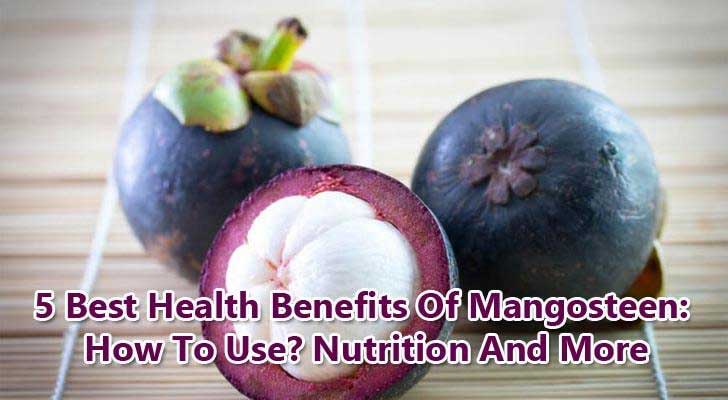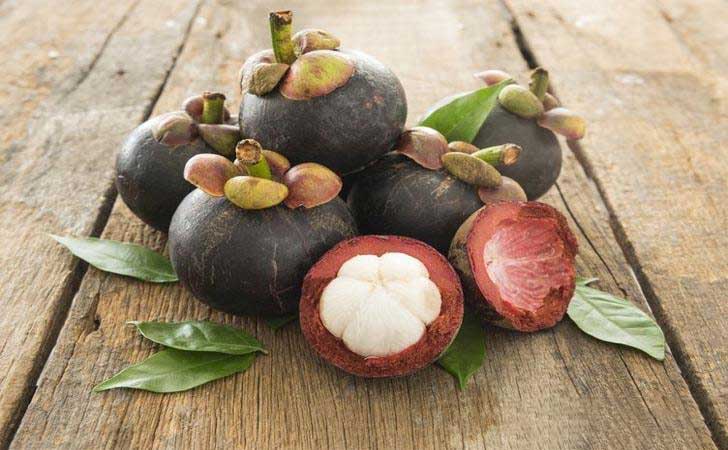What is Mangosteen? Where Does It Grow?
Mangosteen, other named “fruit of the gods” or “queen of fruits” is a tropical fruit that is not familiar to us at all, homeland being half-island of Malaya and Sunda Islands.
A very thick textured shell with a pleasant purple color contains the eaten part of mangosteen. Mangosteen, a white and soft interior, is widely consumed mostly in South Asian countries and especially in Indonesian cuisine.
Mangosteen has a unique flavor as one of the fruits native to Asia and can be used in many different areas in the kitchen as well as being consumed as a fruit.

Mangosteen “The Queen of Fruits”
Mangosteen is a fruit shaped like an orange-sized sphere of 50 -150 grams in general. On the top of mangosteen, that is, around handle, there are 4 -8 protrusions similar to a hat.
The woody hard shell, 4 -6 cm thick, covering almost two-thirds of mangosteen, was previously light green or even white; later on, it turns dark green, when begins to ripen, turns pink, red and finally a purple color like eggplant.
Underneath this hard crust, like tangerine slices or large garlic cloves, 5-7 pieces, 3-5 cm diameter fleshy part, becomes snow-white or cream-colored. While some of these parts have cores, others are seedless.
This edible part inside is very sweet, slightly sourish, has a sharp flavor, soft, juicy, melts in the mouth, makes a little cooler.
Mangosteen leaves a flavor of peach, raspberry, pineapple or a mixture of strawberries and grapes in the mouth. So almost all the flavors we love are in the Mangosteen.
It is a unique fruit that can be eaten with a fork, cut from the head like a watermelon, cut in half with a sweet spoon or cut in half with a sharp knife. Which is called “Fruit of the gods” or “queen of the fruits”, can be consumed by making canned, ice cream, syrup, syrup, jam, vinegar, liqueur, and added to fruit salads, while it is usually eaten fresh. Green fruits are consumed with sour taste and seeds by boiling or roasting.
Nutritional Value of Mangosteen
- 72 calories,
- 0.6 grams of total fat,
- 7 milligrams sodium,
- 48 milligrams potassium,
- 18 grams carbohydrates,
- 1.8 grams of dietary fiber,
- 0.4 grams protein,
- 35 IU vitamin A,
- 2.9 milligrams of vitamin C,
- 12 milligrams of calcium,
- 0.3 milligrams iron,
- It contains 13 milligrams of magnesium.

5 Amazing Health Benefits Of Mangosteen
Antioxidant Store!
Like most tropical fruits, it is rich in vitamins, minerals, beneficial substances and especially antioxidants. In mangosteen including polyphenols, catechins, polysaccharides, tannins, resins, carbohydrates, glucose, and fructose are B1, B2, B3, B5, B6, B9, vitamin C, calcium, phosphorus, potassium, iron, magnesium, manganese, sodium, zinc, minerals and oligo-elements.
These are enough to make mangosteen a full tank of antioxidants. When the relationship between this fruit and antioxidant, that is, destroyer of free radicals harmful to the body, is investigated, it is proven that fruit with the highest antioxidant effect in the world is mangosteen. In this respect, prunes, pomegranates, raisins, blueberries, berries, raspberries, plums, oranges, kiwis, grapefruit are very much in front of the fruits known for their antioxidant content.
Of course, this high antioxidant value makes mangosteen a fruit that is very beneficial for all body health, increases cell renewal rate, rejuvenates, protects from cancer and other diseases, strengthens skin health and many more positive, beneficial effects.
Strengthens Immune System!
The very powerful antioxidant effect of mangosteen described above has a positive effect on all body health and all body systems.
It contains beneficial elements and compounds that repair and strengthen the body’s immune system, every organ, every tissue, protects against diseases. It may be possible to prevent diseases by consuming this fruit.
It Relieves Inflammation!
The nutritious and health-giving content of this fruit makes it a very valuable nutrient. It has anti-inflammatory, anti-inflammatory, bactericidal and fungicidal effects from mangos with its beneficial elements and compounds.
People prone to infectious diseases are especially recommended to consume mangosteen. In alternative medicine, it is good to consume mangos in the treatment of problems such as diarrhea, dysentery, bladder inflammation in approaches that favor natural treatment.
Protects Skin Health!
It is a skin-friendly food with plenty of vitamin A and C and antioxidants found in mangosteen. It reduces the effects of aging by accelerating the regeneration of skin cells, helping to treat eczema-like skin diseases.
Fixes Digestive System Problems!
It is a food that is beneficial to the health of the digestive system. Especially in the natural treatment of chronic child and adult diarrhea, it is recommended to drink mangosteen shell waiting in water overnight by brewing it like herbal tea.
6 Surprising Ways to Use Mangosteen
- Dried and pulverized fruit peel is applied to the abdomen in case of dysentery problems.
- In eczema and other skin conditions, it is turned into an ointment and wrapped around.
- Mangosteen tree bark is boiled and drunk like tea in diarrhea, bladder inflammation (cystitis) and gonorrhea.
- High fever, canker, diarrhea, dysentery, and urinary disorders mangosteen leaves and tree bark are boiled together to drink.
- Extract of the bark of the mangosteen tree is used as a drug for amoebic dysentery.
